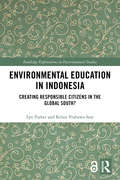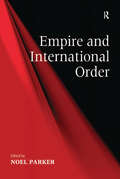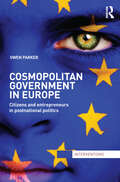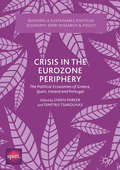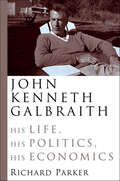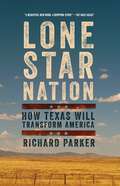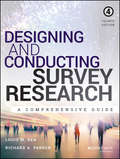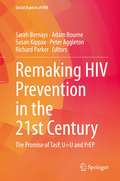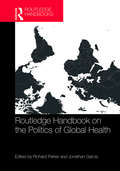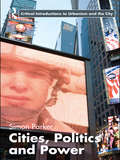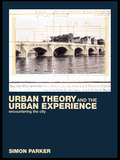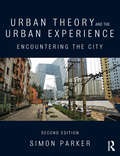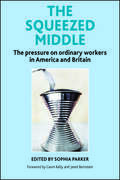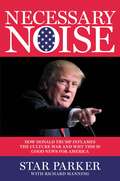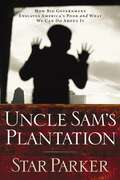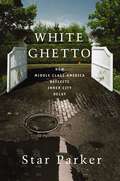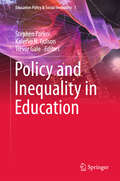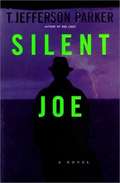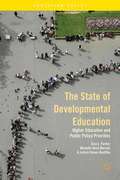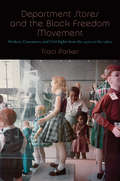- Table View
- List View
Environmental Education in Indonesia: Creating Responsible Citizens in the Global South? (Routledge Explorations in Environmental Studies)
by Lyn Parker Kelsie Prabawa-SearIndonesia’s wealth of natural resources is being exploited at breakneck speed, and environmental awareness and knowledge among the populace is limited. This book examines how young people learn about the environment to see how education can help to develop environmental awareness and avert vast environmental destruction, not only in Indonesia, but also in the Global South more generally. Based on in-depth studies conducted in the cities of Yogyakarta and Surabaya, complemented with surveys of students in secondary schools, Environmental Education in Indonesia examines educational curricula, pedagogy and "green" activities to reveal what is currently being done in schools to educate children about the environment. The book investigates the shortcomings in environment education, including underqualified teachers, the civil service mentality, the still-pervasive chalk-and-talk pedagogy and the effect of the examination system. It also analyses the role of local government in supporting (or not) environmental education, and the contribution of environmental NGOs. The book establishes that young people are not currently being exposed to effective environmental education, and the authors propose that the best and most culturally appropriate way forward in Indonesia is to frame pro-environment behaviour and responsibility as a form of citizenship, and specifically that environmental education should be taught as a separate subject. This book will be of great interest to students and scholars of contemporary Indonesia and Southeast Asia, education for sustainability and environmental education, as well as sustainability and sustainable development more generally.
Empire and International Order
by Noel ParkerEmpires have returned as features of the international scene. With the Cold War's global ideological contest gone, alternative structures such as the War on Terror or the Clash of Civilizations losing credibility, and even the unipolar position of the USA no longer self-evident, the operations of competing empires, history's best known form of order imposed over territories and peoples, acquires renewed credibility. Empire and International Order presents a critical examination of how useful the concept of empire is for understanding varieties of international order across time and place. Original contributions from an international team of upcoming and distinguished scholars analyse a wealth of theoretical approaches alongside contemporary themes enabling the reader to understand the desire to shift the ground of analysis away from the current literature of immediate issue of the US towards the disciplines of international relations, politics, and political/sociological theory.
Cosmopolitan Government in Europe: Citizens and Entrepreneurs in Postnational Politics (Interventions)
by Owen ParkerThe invocation of ‘the market’ has been omnipresent in media discussions of ‘crisis Europe’. On the one hand, ‘the market’ is presented as that to which EU member states must collectively respond. It is the very purpose of a post-national government and that which dictates individual and collective identities. The expansion of market is that which guarantees and constitutes peace in Europe. On the other hand, ‘the market’ is that which government must seek to tame. It is the servant of government and ought not be permitted to undermine collective identities and solidarities associated with the juridical imaginary of social contract and sovereign nation-state. It is, from this perspective, the expansion of the social institutions of nation-state into the post-national arena that will constitute a lasting peace in Europe. Cosmopolitan Government in Europe uses a Foucauldian lens to consider the ethics of the scholarly and institutional discourses associated with these apparently divergent market and legal cosmopolitan visions of Europe. It reflects on attempts to reconcile or move beyond these discourses, particularly through the invocation of more pluralist modes of governance, but claims that such moves have been largely unsuccessful in both practice and theory. It argues that the very ambiguity in the relationship between the ideal subjects that these market and legal visions promote – respectively, post-national ‘entrepreneur’ and ‘citizen’ – is that which permits a space for resistance and politics. Thus, the book argues for a pragmatic politics which is cognizant of the violent potential inherent in any cosmopolitan attempt to govern Europe, while recognising the contemporary dangers associated with the dominance of a market cosmopolitan Europe. This work is an important and timely intervention in contemporary debates about democratic Europe and its shortcomings and will be of great interest to scholars of international political theory, European studies and international political economy.
Crisis in the Eurozone Periphery
by Owen Parker Dimitris TsarouhasThis book investigates the causes and consequences of crisis in four countries of the Eurozone periphery – Greece, Spain, Portugal and Ireland. The contributions to this volume are provided from country-specific experts, and are organised into two themed subsections: the first analyses the economic dynamics at play in relation to each state, whilst the second considers their respective political situations. The work debates what made these states particularly susceptible to crisis, the response to the crisis and its resultant effects, as well as the manifestation of resistance to austerity. In doing so, Parker and Tsarouhas consider the implications of continued fragilities in the Eurozone both for these countries and for European integration more generally.
Brazil and the Quiet Intervention, 1964 (Texas Pan American Series)
by Phyllis R. Parker&“Parker has used recently declassified American materials and interviews . . . to reconstruct the steps that led to the creation of Operation Brother Sam.&” —The American Historical Review When the Brazilian military overthrew President João Goulart in 1964, American diplomats characterized the coup as a &“100 percent Brazilian movement.&” It has since become apparent, largely through government documents declassified during the course of research for this book, that the United States had an invisible but pervasive part in the coup. Relying principally on documents from the Johnson and Kennedy presidential libraries, Phyllis Parker unravels the events of the coup in fascinating detail. The evidence she presents is corroborated by interviews with key participants. US interference in the Goulart regime began when normal diplomatic pressure failed to produce the desired enthusiasm from him for the Alliance of Progress. Political and economic manipulations also proving ineffective, the United States stood ready to back a military takeover of Brazil&’s constitutional democracy. US operation &“Brother Sam&” involved shipments of petroleum, a naval task force, and tons of arms and ammunition in preparation for intervention during the 1964 coup. When the Brazilian military gained control without calling on the ready assistance, U.S. policy makers immediately accorded recognition to the new government and set in motion plans for economic support.
Brazil and the Quiet Intervention, 1964 (Texas Pan American Series)
by Phyllis R. Parker&“Parker has used recently declassified American materials and interviews . . . to reconstruct the steps that led to the creation of Operation Brother Sam.&” —The American Historical Review When the Brazilian military overthrew President João Goulart in 1964, American diplomats characterized the coup as a &“100 percent Brazilian movement.&” It has since become apparent, largely through government documents declassified during the course of research for this book, that the United States had an invisible but pervasive part in the coup. Relying principally on documents from the Johnson and Kennedy presidential libraries, Phyllis Parker unravels the events of the coup in fascinating detail. The evidence she presents is corroborated by interviews with key participants. US interference in the Goulart regime began when normal diplomatic pressure failed to produce the desired enthusiasm from him for the Alliance of Progress. Political and economic manipulations also proving ineffective, the United States stood ready to back a military takeover of Brazil&’s constitutional democracy. US operation &“Brother Sam&” involved shipments of petroleum, a naval task force, and tons of arms and ammunition in preparation for intervention during the 1964 coup. When the Brazilian military gained control without calling on the ready assistance, U.S. policy makers immediately accorded recognition to the new government and set in motion plans for economic support.
John Kenneth Galbraith: His Life, His Politics, His Economics
by Richard ParkerThe life and times of America's celebrated economist, assessing his lessons-and warnings-for us today.John Kenneth Galbraith's books—among them The Affluent Society and American Capitalism—are famous for good reason. Written by a scholar renowned for energetic political engagement and irrepressible wit, they are models of provocative good sense that warn prophetically of the dangers of deregulated markets, war in Asia, corporate greed, and stock-market bubbles. Galbraith's work has also deeply-and controversially-influenced his own profession, and in Richard Parker's hands his biography becomes a vital reinterpretation of American economics and public policy.Born and raised on a small Canadian farm, Galbraith began teaching at Harvard during the Depression. He was FDR's "price czar" during the war and then a senior editor of Fortune before returning to Harvard and to fame as a bestselling writer. Parker shows how, from his early championing of Keynes to his acerbic analysis of America's "private wealth and public squalor," Galbraith regularly challenged prevailing theories and policies. And his account of Galbraith's remarkable friendship with John F. Kennedy, whom he served as a close advisor while ambassador to India, is especially relevant for its analysis of the intense, dynamic debates that economists and politicians can have over how America should manage its wealth and power. This masterful chronicle gives color, depth, and meaning to the record of an extraordinary life.
Lone Star Nation: How Texas Will Transform America
by Richard ParkerA provocative and eye-opening look at the most explosive and controversial state in America, where everything is bigger, bolder--and shaping our nation's future in surprising ways To most Americans, Texas has been that love-it-or-hate it slice of the country that has sparked controversy, bred presidents, and fomented turmoil from the American Civil War to George W. Bush. But that Texas is changing--and it will change America itself. Richard Parker takes the reader on a tour across today's booming Texas, an evolving landscape that is densely urban, overwhelmingly Hispanic, exceedingly powerful in the global economy, and increasingly liberal. This Texas will have to ensure upward mobility, reinvigorate democratic rights, and confront climate change--just to continue its historic economic boom. This is not the Texas of George W. Bush or Rick Perry. Instead, this is a Texas that will remake the American experience in the twenty-first century--as California did in the twentieth--with surprising economic, political, and social consequences. Along the way, Parker analyzes the powerful, interviews the insightful, and tells the story of everyday people because, after all, one in ten Americans in this century will call Texas something else: Home.
Designing and Conducting Survey Research
by Richard A. Parker Louis M. ReaDesigning & Conducting Survey Research, third editionSince it was first published in 1992, Designing and Conducting Survey Research has become the standard reference in the field for public and nonprofit managers who are responsible for conducting effective and meaningful survey research. This updated and expanded third edition builds on the first two volumes and contains additional statistical techniques, new reporting methods that meet the growing demands for accountability, and more user-friendly analysis methods.Designing and Conducting Survey Research is a complete, practical guide to conducting sample survey research. In a comprehensive manner, it explains all major components of survey research, including construction of the instrument, administration of the process, and analysis and reporting of results. Clear, concise, and accessible, this guide explains how to conduct a survey research project from start to finish. Further, it shows how this research method can be applied in such diverse fields as urban affairs, social science, and public administration. Designing and Conducting Survey Research is an excellent tool that will help both professionals and students understand and explain the validity of sample survey research.Praise for the Previous Edition of Designing & Conducting Survey Research"Clear, thorough, well-written, and eminently practical. Takes you step by step through all you need to know to conduct a survey or evaluate one and provides a basic understanding of the theoretical basis of sampling. The clarity of the book makes it a model for effective instruction and one that opens the road for those who must master the subject themselves."-Norton Long, professor emeritus of political science, University of Missouri, St. Louis"A basic tool for conducting survey research projects that any researcher can understand and use. Freed of confusing statistical theory yet comprehensive in approach, with step by step details."-John B. Sauvajot, public management consultant and former deputy chief administrative officer, San Diego County"Demystifies the arcane world of pollsters and survey research. Anyone who conducts surveys, hires survey consultants, reads reports, or makes policy based on survey data will benefit from this book."-Robert J. Waste, Survey Research Center, California State University, Chico
Remaking HIV Prevention in the 21st Century: The Promise of TasP, U=U and PrEP (Social Aspects of HIV #5)
by Richard Parker Peter Aggleton Susan Kippax Sarah Bernays Adam BourneThis edited collection brings together the social dimensions of three key aspects of recent biomedical advance in HIV research: Treatment as Prevention (TasP), new technologies such as Pre-Exposure Prophylaxis (PrEP), and the Undetectable equals Untransmittable (U=U) movement. The growth of new forms of biomedical HIV prevention has created hope for the future, signalling the possibility of a world without AIDS. In this context, the volume discusses the profound social, political and ethical dilemmas raised by such advances, which are to do with readiness, access, equity and availability. It examines how HIV prevention has been, and is, re-framed in policy, practice and research, and asks: How best can new biomedical technologies be made available in a profoundly unequal world? What new understandings of responsibility and risk will emerge as HIV becomes a more manageable condition? What new forms of blame will emerge in a context where the technologies to prevent HIV exist, but are not always used? How best can we balance public health’s concern for adherence and compliance with the rights of individuals to decide on what is best for themselves and others? Few of these questions have thus far received serious consideration in the academic literature.The editors, all leaders in the social aspects of HIV, have brought together an innovative and international collection of essays by top thinkers and practitioners in the field of HIV. This book is an important resource for academics and professionals interested in HIV research.Chapters "Anticipating Policy, Orienting Services, Celebrating Provision: Reflecting on Scotland’s PrEP Journey", "How the science of HIV treatment-as-prevention restructured PEPFAR’s strategy: The case for scaling up ART in ‘epidemic control’ countries", "Stigma and confidentiality indiscretions: Intersecting obstacles to the delivery of Pre-Exposure Prophylaxis to adolescent girls and young women in east Zimbabwe" and "The drive to take an HIV test in rural Uganda: a risk to prevention for young people?" are available open access under a Creative Commons Attribution 4.0 International License via link.springer.com.
Routledge Handbook on the Politics of Global Health
by Richard Parker Jonathan GarcíaIn the early twenty-first century, key public health issues and challenges have taken centre stage on the global scene, and health has been placed at the heart of our collective aspirations for human development and well-being. But significant debate exists not only about the causes, but also about the possible solutions for nearly all of the most important global health challenges. Competing visions of the values and perspectives that should underlie global health policies have emerged, ranging from an emphasis on cost eff ectiveness and resource constraints on one extreme, to new calls for health and human rights, and renewed calls for health and social justice on the other. The role of different intergovernmental agencies, bilateral or unilateral donors, public or private institutions and initiatives, has increasingly been called into question, whilst the spread of neoliberal policies and programmes, and existing international trade regimes and intellectual property rights, are deeply implicated in relation to global health responses. This volume critically evaluates how the global health industry has evolved and how the interests of diverse political and economic stakeholders are shaping the context of a rapidly changing institutional landscape. Bringing together leading authors from across the world, the Handbook’s eight sections explore: • Critical perspectives on global health • Globalisation, neoliberalism, and health systems • The changing shape of global health governance • Development assistance and the politics of global health • Scale-up, scale-down, and the sustainability of global health programmes • Intellectual property rights, trade relations, and global health • Humanitarian emergencies and global health politics • Human rights, social justice, and global health The Routledge Handbook on the Politics of Global Health addresses both the emerging issues and conceptualisations of the political strategies, policy-making processes, and global governance of global health, along with expanding upon and highlighting the critical priorities in this rapidly evolving field. It provides an authoritative overview for students, practitioners, researchers, and policymakers working in or concerned with the politics of public health around the globe.
Cities, Politics & Power (Routledge Critical Introductions to Urbanism and the City)
by Simon ParkerTraditionally, the study of ‘power in the city’ was confined to the institutions of urban government and the actors involved in contesting and making political decisions in and for metropolitan societies. Increasingly, however, attention has turned to the function of the city not only as a centre of urban governance but as a major economic, social, cultural and strategic force in its own right. Cities, Politics and Power combines this traditional concern with how the cities in which we live are organized and run with a broader focus on cities and urban regions as multiple sites and agents of power. This book is divided into five sections, with a short introduction outlining the argument and organisation of the text. Part two charts the development of the urban polity and considers the ways in which coercion and force continue to be used to segregate, oppress and annihilate urban populations. Part three critically examines the key collective actors and processes that compete for and organise political power within cities, and how urban governance operates and interacts with lesser and greater scales of government and networks of power. Part four then explores the ways in which ‘the political’ is constituted by urban inhabitants, and how social identity, information and communication networks, and the natural and built environment all comprise intersecting fields of urban power. The conclusion calls for a broader theoretical and thematic approach to the study of urban politics. This book makes extensive use of comparative and historical case studies, providing broad coverage of politics and urban movements in both the Global North and the Global South, with a particular focus on the UK, USA, Canada, Latin America and China. It is written in an accessible and lucid style and provides suggestions for further reading at the end each chapter.
Taking Power Back: Putting People in Charge of Politics
by Simon ParkerFaith in the UK’s political system has reached new lows. Politicians and commentators are lining up to offer answers, but what if the problem goes beyond left and right, trust and bureaucracy? What if the system puts too much power in the hands of politicians in London and not enough in the hands of ordinary people? This important book addresses a key issue of our time: where should power and governance lie in our democracy? Simon Parker, a leading expert on public services and government, claims the answer is to give power away. Indeed, across the country, communities and cities are already starting to take matters into their own hands, reinventing citizenship for the 21st century. Including fascinating interviews with former ministers and officials about their experience of managing the central state, as well as illuminating international case studies, Parker offers policy recommendations and practical ideas for giving power away and creating a new kind of politics focused on unleashing society's creative potential. In so doing, he provides a route map for change, showing how decentralisation can make us happier, healthier and more equal.
Urban Theory and the Urban Experience: Encountering the City
by Simon ParkerFor the first time Urban Theory and the Urban Experience brings together classic and contemporary approaches to urban research in order to reveal the intellectual origins of urban studies, and the often unacknowledged debt that empirical and theoretical perspectives on the city owe to one another. Both students and urban scholars will appreciate the critical way in which classical and contemporary debates on the nature of the city are presented. Extensive use is made throughout of documentary, literary and cultural sources to bring the different theoretical perspectives to life. Discussion points introduce and explain key concepts and intellectual histories in a jargon free manner. End of chapter further readings have also been annotated to encourage additional study.
Urban Theory and the Urban Experience: Encountering the City
by Simon ParkerUrban Theory and the Urban Experience brings together classic and contemporary approaches to urban research in order to reveal the intellectual origins of urban studies and the often unacknowledged debt that empirical and theoretical perspectives on the city owe one another. From the foundations of modern urban theory in the work of Weber, Simmel, Benjamin and Lefebbvre to the writings of contemporary urban theorists such as David Harvey and Manuel Castells and the Los Angeles school of urbanism, Urban Theory and the Urban Experience traces the key developments in the idea of the city over more than a century. Individual chapters explore investigative studies of the great metropolis from Charles Booth to the contemporary urban research of William J. Wilson, along with alternative approaches to the industrial city, ranging from the Garden City Movement to ‘the new urbanism’. The volume also considers the impact of new information and communication technologies, and the growing trend towards disaggregated urban networks, all of which raise important questions about viability and physical and social identity of the conventional townscape. Urban Theory and the Urban Experience concludes with a rallying cry for a more holistic and integrated approach to the urban question in theory and in practice if the rich potent. For the benefit of students and tutors, frequent question points encourage exploration of key themes, and annotated further readings provide follow-up sources for the issues raised in each chapter. The book will be of interest to students, scholars, practitioners and all those who wish to learn more about why the urban has become the dominant social, economic and cultural form of the twenty-first century
The Squeezed Middle: The Pressure on Ordinary Workers in America and Britain
by Sophia ParkerAs wages stagnate but living costs keep rising, the pressure on working people grows more intense. The issue of living standards has become one of the most urgent challenges for politicians in both Britain and America. 'The squeezed middle' brings together experts from both sides of the Atlantic to ask what the UK can learn from the US. American workers have not benefited from growth for an entire generation - the average American worker earned no more in 2009 than in 1975. Now British workers are undergoing a similar experience. No longer can they assume that when the economy grows their wages will grow with it. This collection brings together for the first time leading economic and policy thinkers to analyse the impact of different policies on those on low-to middle incomes and to explain what lessons the UK can learn from America's 'lost generation'. This timely book is essential reading for everyone concerned about the living standards crisis, an issue which could decide elections as well as shaping the future for millions of working families.
Necessary Noise: How Donald Trump Inflames the Culture War and Why This Is Good News for America
by Star ParkerPopular FOX commentator Star Parker explains why today's noisy political rhetoric is good for you and provides specifics on why Trump's presidency is vital for America's future.Star Parker was among the many reeling and confused as Donald Trump became the 45th president of the United States. But, she argues, a silver lining to this outcome is the debate that has since ruled our media and private conversations.The ongoing noise of debate can seem overwhelming, but our country needs the authentic and candid dialogue of its people. And Trump's presidency provides us with an opportunity like never before to engage and work to preserve the values upon which America was built. Necessary Noise honestly examines the crossroads where we find ourselves and suggests ways of moving toward resolution and restoration. Tackling a wide range of topics on which citizens should get noisy--from immigration, to education, to abortion, to welfare--Necessary Noise provides the framework for how to take part in this important time in history using our voices.
Uncle Sam's Plantation: How Big Government Enslaves America's Poor and What We Can Do About It
by Star ParkerAmerica has two economic systems: capitalism for the rich and socialism for the poor. This double-minded approach seems to keep the poor enslaved to poverty while the rich get richer. Let's face it, despite its $400 billion price tag, welfare isn't working. The solution, asserts Star Parker, is a faith-based, not state-sponsored, plan. In Uncle Sam's Plantation, she offers five simple yet profound steps that will allow the nation's poor to go from entitlement and slavery to empowerment and freedom. Parker shares her own amazing journey up from the lower rungs of the economic system and addresses the importance of extending the free market system to this neglected group of people. Emphasizing personal initiative, faith, and responsibility, she walks readers toward releasing the hold poverty has over their lives.
White Ghetto: How Middle Class America Reflects Inner City Decay
by Star ParkerDecaying values. Sexually transmitted diseases. Fatherless homes. Rampant drug use. These aren't just problems for today's inner cities. It's the plight of all America. Much has been said about Bill Cosby's incendiary remarks about urban black culture and its "dirty laundry." But in this provocative book, Star Parker, one of today's most controversial commentators, goes even further, proving that urban plight simply reveals a decay that is gnawing its way throughout American society as a whole. The sexual chaos, values disorientation, and social turmoil we see in our inner cities, Parker argues, is just a magnified reflection of the moral collapse happening all over America: in our schools, our churches, our homes. And this slide toward moral decrepitude is all due to a flagrant dismissal of and assault on America's tried-and-true values. With startling statistics and disturbing stories about the increasing secularization and criminalization of the middle class, Parker holds a cracked mirror up to suburbia. Taking on tough subjects such as abortion, drug abuse, sexual politics, and religion, she offers a rousing exploration of the raging cultural war-taking you on a wild, eye-opening tour through the White Ghetto. Star Parker is the founder and president of CURE, the Coalition on Urban Renewal & Education, a nonprofit organization that provides national dialogue on issues of race and poverty in the media, inner city neighborhoods, and public policy. Star is a regular commentator on CNN, MSNBC, Fox News, and the BBC, which reaches 300 million homes worldwide. Her articles and quotes have also appeared in major publications including the Wall Street Journal, the Washington Post, and the New York Times, and is currently a weekly syndicated columnist for Scripps Howard News Service. Star is the author of Pimps, Whores, and Welfare Brats and Uncle Sam's Plantation.
Policy and Inequality in Education
by Stephen Parker Kalervo N. Gulson Trevor GaleThis book is an edited collection introducing the Education Policy and Social Inequality series, and presents chapters from authors on the editorial board. It investigates relations between educational policy and social inequality, not simply in terms of policy solutions for inequalities but also how education policy frames, creates and at times exacerbates social inequalities. It adopts a critical stance, encompassing innovative and interdisciplinary theoretical and conceptual studies - drawing on e. g. sociology, cultural studies, social and cultural geography, and history - as well as original empirical work that examines a range of educational contexts, including early years education, vocational and further education, informal education, K-12 schooling and higher education. The book argues that critique and policy studies can have a transformative function, positing new dimensions for understanding the role of education policy in connection with recurrent social problems and seeking the amelioration of social inequality in ways that challenge the possibility of equity in the liberal democratic state, as well as in other forms of governance and government.
Silent Joe (First Edition)
by T. Jefferson ParkerJoe Trona is scarred in more ways than one. Rescued from an orphanage by Will Trona, a charismatic politician who sensed his dark potential, Joe is swept into the maelstrom of influence and intimidation that surrounds his adoptive father's career.
Making Government Work
by Tan ParkerMaking Government Work: A Conservative Agenda for the States is an updated version of the highly acclaimed 1994 original book. It serves as a modern-day guide for how as Americans we can move the states forward with common sense, conservative public policy initiatives to benefit the Nation as a whole. Making Government Work is a reminder that conservative reforms set the stage for unprecedented prosperity. The book contains a star-studded line up of some of today&’s most powerful voices, including Nikki Haley, Chuck Norris, Rick Perry, Kathy Ireland, Rick Santorum, Chad Hennings, Jeb Bush, Dr. Art Laffer and Bob Woodson along with many more. "Making Government Work is for state government what the Contract with America was for the federal government. It is a sensible, fact based plan to create a better future through the application of sound principles." –Newt Gingrich, former Speaker of the House The author&’s proceeds from the book will be donated to organizations that serve America&’s veterans.
The State Of Developmental Education
by Tara L. Parker Michelle Sterk Barrett Leticia Tomas BustillosThe State of Developmental Education is the first book to provide a thorough, comparative picture of how developmental education is carried out at higher education institutions and investigate how different state-level policies and priorities change the availability, types, and quality of developmental education available.
Department Stores and the Black Freedom Movement: Workers, Consumers, and Civil Rights from the 1930s to the 1980s (The John Hope Franklin Series in African American History and Culture)
by Traci ParkerIn this book, Traci Parker examines the movement to racially integrate white-collar work and consumption in American department stores, and broadens our understanding of historical transformations in African American class and labor formation. Built on the goals, organization, and momentum of earlier struggles for justice, the department store movement channeled the power of store workers and consumers to promote black freedom in the mid-twentieth century. Sponsoring lunch counter sit-ins and protests in the 1950s and 1960s, and challenging discrimination in the courts in the 1970s, this movement ended in the early 1980s with the conclusion of the Sears, Roebuck, and Co. affirmative action cases and the transformation and consolidation of American department stores. In documenting the experiences of African American workers and consumers during this era, Parker highlights the department store as a key site for the inception of a modern black middle class, and demonstrates the ways that both work and consumption were battlegrounds for civil rights.
United States and Its Neighbors
by Walter C. Parker Mary Mcfarland Gloria Ladson-Billings Jean Craven Gloria Contreras Barry K. Beyer James A. BanksLearn about the history of United States and the countries around it.
